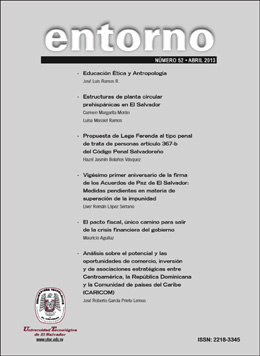Proposal of lege ferenda to the criminal type of trafficking in persons article 367-b of the Salvadoran penal code
DOI:
https://doi.org/10.5377/entorno.v0i52.6791Keywords:
Human trafficking, Criminal law, Theory of crim.Abstract
El Salvador penalizes human trafficking in Article 367B of the Criminal Code, which generally is adapted to international requirements, and in particular to the United Nations Protocol to Prevent, Suppress and Punish Trafficking in Persons, especially women and children. However, there are certain aspects that should be considered in a future reform, as the incomplete configuration and application of the criminal offense contribute to the impunity of traffickers and, consequently, to the continuation and growth of this criminal activity.
In this sense, the study was conducted on the Salvadoran criminal offense of human trafficking, using the dogmatic research method; through the study of the legal doctrine available, mainly Spanish criminal doctrine, given to its influence and similarity to the Salvadoran legal system and Latin American legal systems in general. The objective of the study is to present concrete proposals of lege ferenda to the criminal offense of human trafficking regulated by the Salvadoran Criminal Code, from the finalist theory of crime; with the aim of improving the protection of human rights of victims, through the correct definition of human trafficking.
As conclusions of the study, it was pointed out the need to make specific reforms to the criminal type in aspects such as its location in the Penal Code, the reference to active subjects and the express determination of the subjective type and the commissive means of crime.
Downloads
532
Downloads
Published
How to Cite
Issue
Section
License
© Entorno
It is required that the authors transfer the right of re-production of their articles to the Entorno Journal

